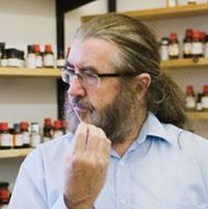Our community lost one of its early members recently.
One of the most widely cited papers among the ISOCS community is a paper by Persaud and Dodd published in Nature in 1982 that influenced many in the development of electronic nose technology [1].
George Dodd was interested in perfumes as a teenager and went on to study Chemistry at Trinity College, Dublin with research projects on molecules found in essential oils. He then began research on small molecules binding to proteins at the University of Oxford and gained a D.Phil (Ph.D) under the supervision of Sir George Radda, publishing a seminal paper in 1969 determining the rate of allosteric transition in the regulatory enzyme glutamate dehydrogenase by a method new in the 1960s, the fluorescence of an environmentally sensitive extrinsic probe.
After working at Unilever in the Molecular Biophysics Research Group for three years, he joined the University of Warwick, UK, in 1971, founding the Warwick Olfactory Research Group, pioneering research on the molecular mechanisms involved in smell, olfactory physiology, the psychology of smell as well as artificial noses. I joined his group in 1976, was enthused with his love of the world of smell and inspired by him, worked on what would be the initial concepts of an artificial nose – now known as electronic noses. A keen master perfumer as well as an entrepreneur, he enjoyed working to create unique fragrances, opening a perfume studio “Craft Perfumes” in Stratford-upon-Avon in 1978. He collaborated with Steve Van Toller – a psychologist and former president of European Chemoreception Organisation (ECRO) who was also at Warwick, publishing a book The Psychology and Biology of Perfumery (eds) Steve Van Toller & George H Dodd; Chapman and Hall; 1988.
He left the University of Warwick in 1994, expanded into the realms of personal perfumes and was a founding director of a smell biotechnology company – Kiotech int plc. He moved to the highlands of Scotland opening “The Perfume Studio”, and often complained that his studio was used a bombing target by the RAF. Whilst there, he also created personal perfumes for a range of pop stars and royalty. He was not even phased when asked to replicate the smell of African elephant droppings. He continued to work with the smell research group at the University of Warwick including Julian Gardner and James Covington.
He sold his business and spent much of the money buying the only red Jaguar XFR in the country with cream leather seats. He always loved fast cars and use to say that “once you have had a car with more than 500bhp you can’t go back!” He was one of the founding Directors of Scent & Aroma Technology Systems Limited (Aroma Academy (www.aroma-academy.co.uk) and Perfume Academy (www.perfume-academy.com)). A keen educator and was the driving force behind World Smell day, He also gave many talks including at the London Science Museum on smell. As part of his commercial work, he was often asked by industry to create smell training kits, developing several aroma training kits, including a Wine Aroma Kit, Whisky Aroma Kit, Gin Aroma Kit, Bourbon Aroma Kit and a Rum Aroma Kit. Members of our community who attended the ECRO Congress 2011 in Manchester, UK will have been entertained by the Whisky tasting workshop that he gave us.
Full of a gazillion eccentric ideas, he was always fascinating to listen to – inspiring many others to enter into the world of smell. We have lost a dear colleague.
Krishna Persaud
University of Manchester
[1] Persaud, K.; Dodd, G. Analysis of Discrimination Mechanisms in the Mammalian Olfactory System Using a Model Nose. Nature, 1982, 299 (5881), 352–355. https://doi.org/10.1088/1751-8113/44/8/085201.

